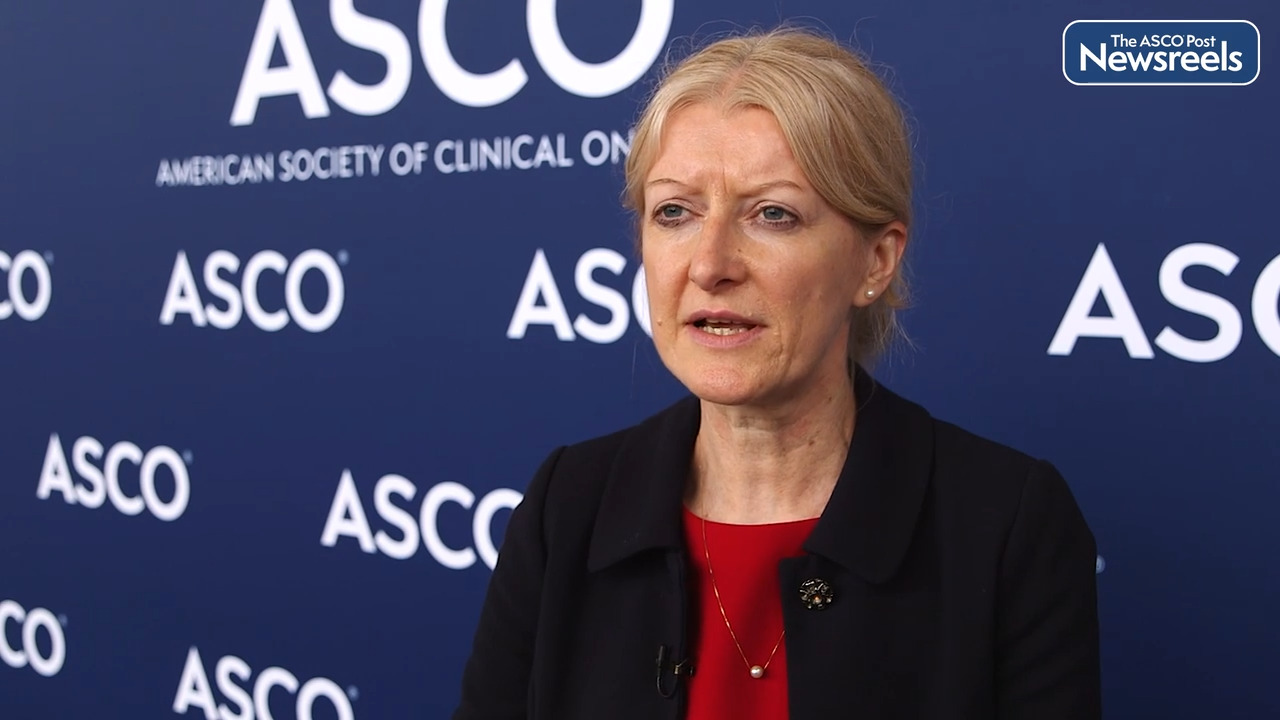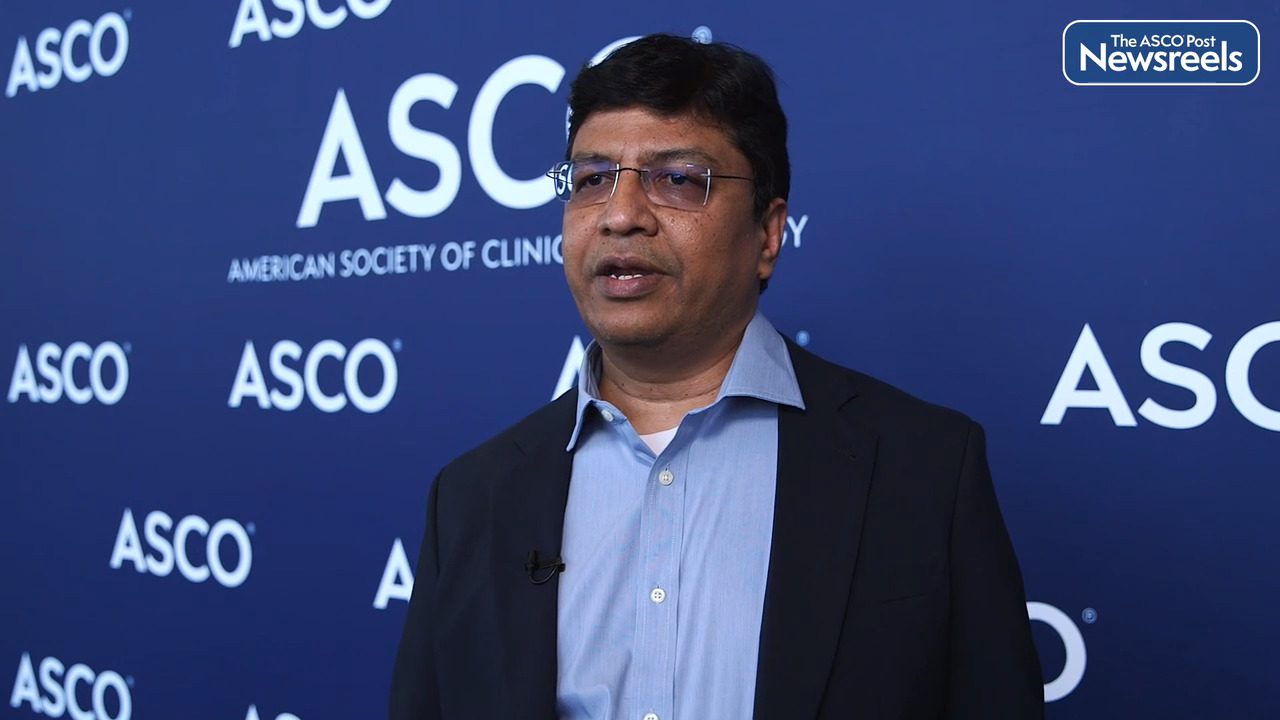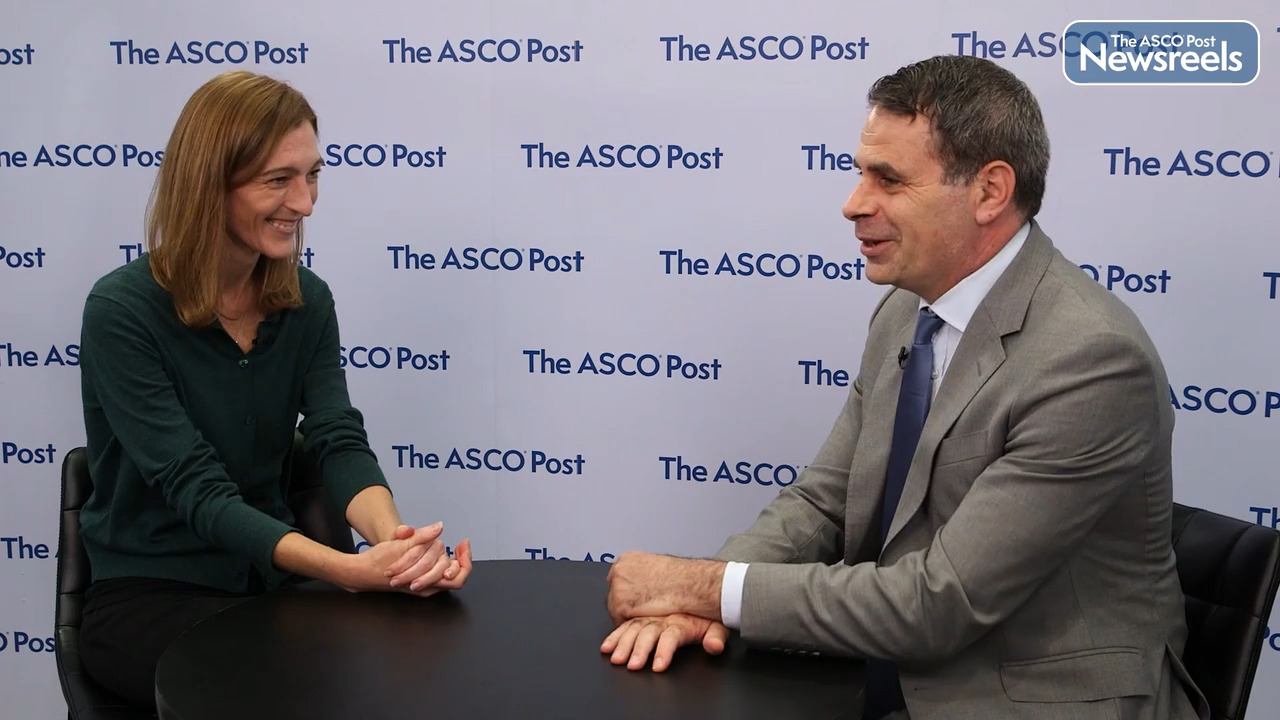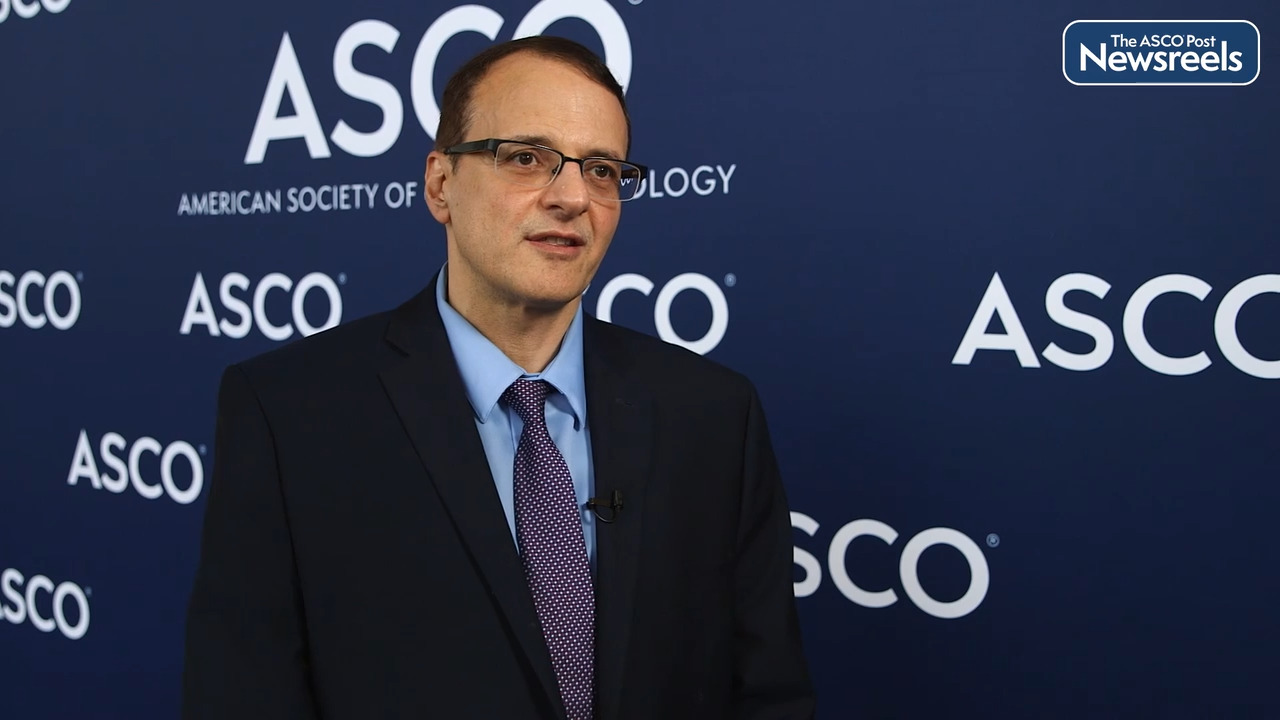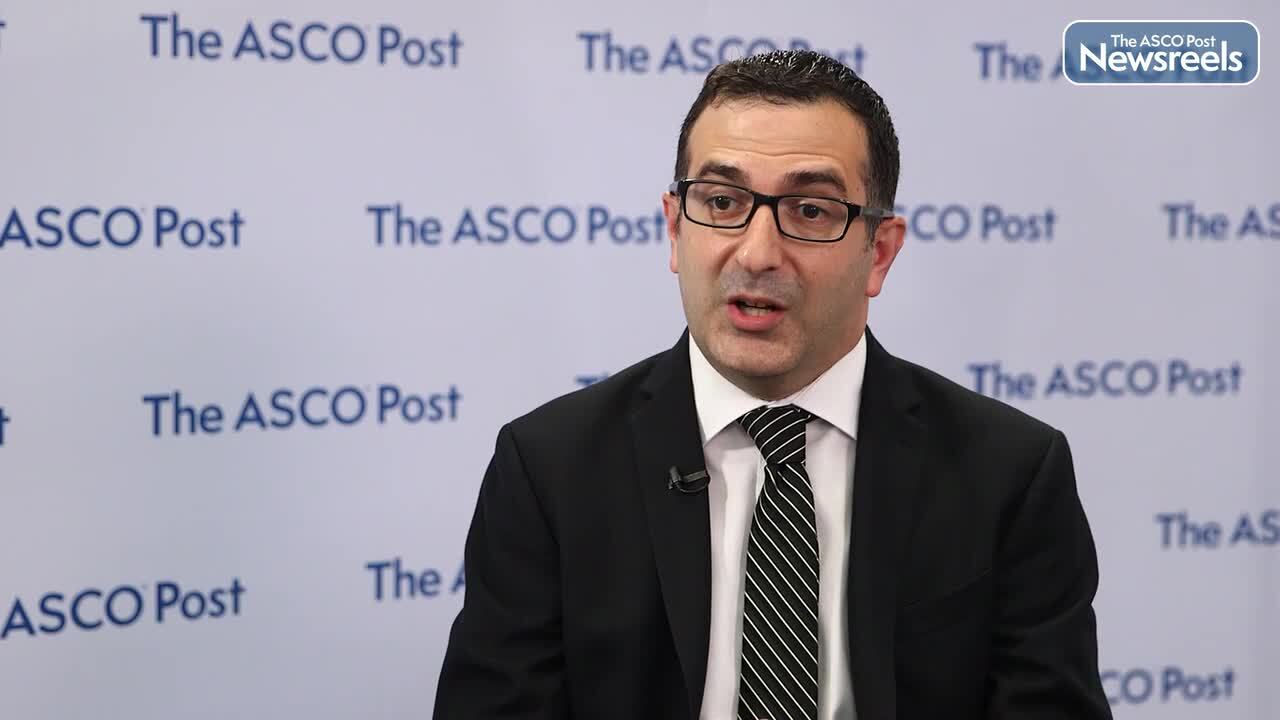Carryn M. Anderson, MD, on Head and Neck Cancer: New Data on Avasopasem Manganese for Oral Mucositis
2022 ASCO Annual Meeting
Carryn M. Anderson, MD, of the University of Iowa Hospital, discusses phase III results of the ROMAN trial of avasopasem manganese for patients with severe oral mucositis who are receiving chemoradiotherapy for locally advanced, nonmetastatic head and neck cancer. Compared with placebo, avasopasem manganese improved severe oral mucositis (Abstract 6005).
Transcript
Disclaimer: This video transcript has not been proofread or edited and may contain errors.
So I'm excited today to report on the results of the ROMAN trial, which is a phase three randomized trial investigating the role of avasopasem manganese in decreasing severe oral mucositis in head and neck cancer patients receiving concurrent IMRT and cisplatin. So let's talk a little bit about background as to why this clinical trial is so important. Our patients who are receiving concurrent IMRT and cisplatin very commonly suffer from the awful side effect of oral mucositis. It causes severe pain in our patients. They often need high doses of narcotics. They may end up being hospitalized because of the severity of the condition and may end up with treatment breaks and also commonly need feeding tube. The oral mucositis grading system that is utilized in the ROMAN trial is the WHO grading system, and this uses a combined physical exam finding of oral mucositis ulcers in the mouth as well as the impact of those ulcers on a patient's diet. So severe oral mucositis is defined as grade three and four, with three meaning that the ulcers are so bad that patients can no longer take solid diet by mouth and are on liquids only, whereas grade four mucositis means they are now feeding tube dependent. We do not have any FDA approved drugs to mitigate this severe side effect. So enter avasopasem manganese. This is an enzyme that rapidly converts radiation-induced superoxide to hydrogen peroxide. And that is important because superoxide is what causes the downstream cascade of events that results in the development of oral mucositis. Now it has been shown in several basic science experiments as well as, now, several clinical trials that the mechanism of this drug does not spare tumor cells from the damaging effects of radiation, but it does mitigate the side effects to normal cells. So this drug has been tested in a randomized phase two placebo-controlled trial, with two doses of the drug compared against placebo. And it's statistically significantly reduced the duration of severe oral mucositis and the incidence, as well as the severity. Importantly, one- and two-year outcomes were maintained, and the drug did not impact tumor control. So the higher dose of the drug, which was more effective in mitigating severe oral mucositis, was brought forth for phase three testing, and that is what we are reporting today. The ROMAN trial included oral cavity and oral pharynx patients who were receiving IMRT with concurrent cisplatin. The drug was given as a 60-minute IV infusion prior to each radiation fraction, ending 60 minutes prior to the administration of the radiation. Patients were stratified by their surgical status and cisplatin dose schedule, and 455 patients were enrolled. The data presented today is on the intention to treat analysis patients of 407 patients. And importantly, the primary endpoint was met. Ava decreased statistically significantly and clinically meaningfully the incidence of severe oral mucositis at the end of IMRT from 64% down to 54% at a P value of 0.045. Also very importantly, the secondary endpoint of duration of severe oral mucositis, which is a very clinically relevant endpoint, was statistically and impressively reduced by 56% from 18 days on the placebo arm down to only eight days in the Ava arm. The incidence of grade four oral mucositis and the duration of grade four mucositis was also nominally reduced but did not quite meet statistical significance. And this drug did delay the onset of severe oral mucositis from 38 days in the placebo arm to 49 days in the Ava arm. The safety profile of this drug was excellent. Patients experienced the side effects already expected for radiation with concurrent cisplatin. There was a slight increase in nausea and vomiting grade one, mild and limited, in the Ava arm. This is a known side effect of this medicine, but that did not translate to an increase in grade three nausea or vomiting. So we're excited to present today that this is a positive trial. The primary endpoint of severe oral mucositis incidents was statistically and clinically meaningfully reduced. The duration of severe oral mucositis was also statistically significantly and clinically meaningfully reduced in this patient population. We did see nominal decreases in grade four mucositis and a delay in onset of severe oral mucositis. We are excited to follow the tumor outcomes on these patients to report on those at one and two years. The drug is being offered to the FDA by the company, and we hope to hear more about that later this year. And we're also exploring some other endpoints, for example, impact on healthcare utilization and impact of the drug on things like cisplatin-induced kidney injury.
Related Videos
The ASCO Post Staff
Mairéad G. McNamara, PhD, MBBCh, of The Christie NHS Foundation Trust, discusses phase II findings of the NET-02 trial, which explored an unmet need in the second-line treatment of patients with progressive, poorly differentiated extrapulmonary neuroendocrine carcinoma. In the trial, the combination of liposomal irinotecan, fluorouracil, and folinic acid, but not docetaxel, met the primary endpoint of 6-month progression-free survival rate (Abstract 4005).
The ASCO Post Staff
Sriram Yennu, MD, of The University of Texas MD Anderson Cancer Center, discusses the placebo response in patients with advanced cancer and cancer-related fatigue. His latest findings show that open-labeled placebo was efficacious in reducing cancer-related fatigue and improving quality of life in fatigued patients with advanced cancer at the end of 1 week. The improvement in fatigue was maintained for 4 weeks (Abstract 12006).
The ASCO Post Staff
Courtney D. DiNardo, MD, MSCE, of The University of Texas MD Anderson Cancer Center, and Stéphane de Botton, MD, PhD, of Institut Gustave Roussy, discuss phase III findings from the IDHENTIFY trial, which showed that mutational burden and co-mutational profiles differed between patients with relapsed or refractory acute myeloid leukemia that exhibited IDH2-R140 and IDH2-R172 mutations. Enasidenib improved survival outcomes for patients with IDH2-R172 mutations: median overall survival and 1-year survival rates were approximately double those in the conventional care arm (Abstract 7005).
The ASCO Post Staff
Nabil F. Saba, MD, of Winship Cancer Institute of Emory University, discusses new data from a trial of pembrolizumab and cabozantinib in patients with recurrent metastatic head and neck squamous cell carcinoma. The study met its primary endpoint of overall response rate. The regimen was well tolerated and exhibited encouraging clinical activity in this patient population (Abstract 6008).
The ASCO Post Staff
Rami Manochakian, MD, of Mayo Clinic Florida, discusses the phase II findings of the NADIM II trial, which confirmed that, in terms of pathologic complete response as well as the feasibility of surgery, combining nivolumab and chemotherapy was superior to chemotherapy alone as a neoadjuvant treatment for locally advanced, resectable stage IIIA non–small cell lung cancer (Abstract 8501).
